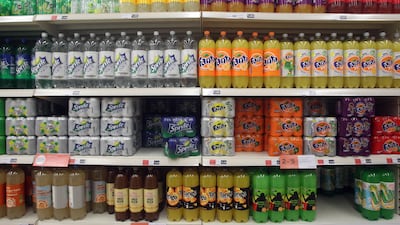The UAE’s decision to switch from a fixed tax on sugary drinks to one that depends on the sugar content per 100 millilitres is a positive step in the fight against obesity and diabetes. Embedding such interventions in holistic approaches to public health is equally important, as humans will always struggle with the innate attractiveness of carbohydrates.
While there are a number of ways to induce changes in people’s behaviour, economists will invariably suggest using prices. In the case of convincing people to consume less sugar, that means applying a tax that makes sugar-laden commodities more expensive to purchase, also known as a “sin tax”.
This straightforward principle can be applied in different ways.
The most direct is applying a tax to goods that have high sugar content, which is the approach that the UAE has taken – and many other countries took in the past. The key advantage of this approach is administrative simplicity: authorities need only to determine whether a good is subject to the tax, and then to apply it. One of the most salient applications of this method is cigarettes, which cost consumers a lot more to buy than the production cost due to steep excise duties that governments around the world levy.
One of the potential drawbacks to this approach, however, is that it creates an incentive for producers to redefine what constitutes a unit of the good to minimise the tax’s impact. This dynamic is illustrated by the 18th-century stamp duty that the British government imposed on newspapers based on the number of pages in an issue. Editors responded by increasing the size of each page and cutting down the number of pages, spawning what is now referred to as the unwieldy “broadsheet” newspaper.
In the context of modern sugary drinks, the analogous process is producers increasing the volume of sugar in drinks either by upping the concentration or simply filling the container with more liquid. Thus, while the tax does make some people less likely to purchase sugary drinks, those who continue to purchase them may end up consuming more sugar than they would have done absent the tax. The result is a muted and potentially indeterminate net effect on the societal consumption of sugar.
Governments are aware of this possibility, and some – such as Mexico and the UK – have responded by applying a tax that depends proportionately on the volume of sugar supplied in a unit of the good, rather than the binary (on-off) form that can motivate producers to increase sugar concentrations.
This closing of the loophole follows in the footsteps of the highly successful application to petrol. In the earlier part of the 20th century, vehicles were taxed at a flat rate. This created an incentive to purchase bigger cars, and did not dissuade people from driving more since the tax would be paid whether the car stood stationary in your driveway or travelled 100,000 kilometres a year.
Once states transitioned towards taxing petrol proportionately, drivers now had an incentive to buy smaller cars, and to use their cars less, switching to walking, cycling and availing of public transport to economise on travel expenditure. This can clearly be seen when comparing the large cars that people own and operate in a low fuel tax environment with the petite ones seen in high fuel tax countries.
The UAE is aiming for something analogous to occur in the case of sugary drinks. One of the associated challenges will be administrative: measuring sugar content precisely and ensuring that producers do not fraudulently report the figure require significant resources, and reflect one of the reasons why some governments continue to prefer the flat taxes.
The more serious challenge that policymakers are likely to face is that the consumption of sugary drinks makes a small contribution at best to the adverse societal outcomes they are looking to abate – obesity, diabetes, heart disease and so on. After all, several other dietary factors also play a role, as do lifestyle ones such as exercise and sleep patterns.
Yet, this is a step in the right direction towards addressing some of the critical public health challenges of our time.
And so, the UAE government is correct in its decision to avoid the “drop in the bucket” fallacy, whereby people defeatedly avoid taking small steps because they believe that the impact will be negligible, even though big results are typically built on accumulated micro efforts. The nation’s leadership has long been using a holistic strategy to address the complex problems associated with poor health choices, and there is no doubt that every little helps, including this sugar tax.
Now it is up to the country’s residents to do their part by striving to make more responsible lifestyle decisions.

